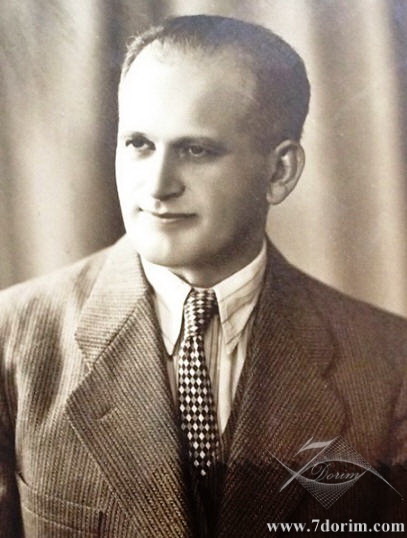
Dr. Fathollah Bina, Physician and Writer
The son of “Morvareed” and “Shokrollah,” Dr. Fathollah Bina was born in 1905 into a wealthy Jewish family in Tehran. He completed his primary and secondary education at the Alliance School and Darolfonoun School, respectively. In 1927, at the age of 22, Fathollah Bina achieved the distinction of becoming the youngest graduate of Tehran School of Medicine. Shortly thereafter, he joined the military as a medic, serving for over seven years. His excellent moral character and medical competence eventually secured him a position with the Ministry of Health, where he was subsequently stationed in Borujerd.
In 1934, Fathollah Bina married “Zinat” from the Dordashti family. They had four daughters (Mahin, Pari, Manijeh, and Minoo) and one son (Bijan). On January 8th 1936, Zinat Dordashti, Dr. Bina’s wife, followed the “Unveiling” law issued by Reza Shah (which banned hijab). Despite being pregnant, she appeared unveiled at a public gathering in Borujerd under the protection of government officials. Zinat became the first unveiled Iranian Jewish woman and delivered a lecture on hijab and women’s rights in Borujerd’s city hall.
Dr. Fathollah Bina demonstrated his exceptional dedication and competence by serving as the head of health departments in various cities, including Borujerd, Ardabil, Babolsar, and the Karaj Road Administration. For example, in 1939, amidst an outbreak of the “plague” in Khorasan Province, he volunteered to care for thousands of patients, despite the personal risk of contracting the disease. He devoted several months to their treatment.
In 1942, amid the turmoil of World War II and the occupation of Iran by Allied forces, contagious diseases had spread across most Iranian cities. Alongside the prevailing insecurity, the capital city faced the dual challenges of famine and the spread of typhoid and typhus. In response, Dr. Bina moved to Tehran and opened his first clinic in the southern part of the city on Shahpour Street, providing medical care to the needy and deprived. Dr. Bina’s excellent service and remarkable successes in the field of medicine over the years led him to open his second clinic in the center of Tehran, near Mokhberoldoleh Square.
After the end of the war and the evacuation of the Allies from Iran in 1948, Mohammad Reza Shah Pahlavi issued a decree to reform the Constitution of 1906, which included provisions for elections and the formation of the Constituent Assembly. As a result, in 1949, Dr. Fathollah Bina was elected to represent the Iranian Jewish community and became a member of the Second Constituent Assembly.
Dr. Fathollah Bina was an eloquent speaker and writer, proficient in several foreign languages (English, French, Russian, and Italian). He dedicated most of his free time to research and study, translated several scientific articles into Persian, and delivered lectures in French and Russian in scientific platforms. In addition to his scientific research, Fathollah Bina conducted studies on history and philosophy. He introduced innovative methods for teaching Persian and literature and, using his own funds, authored, compiled, and published various textbooks for students, including “Daftar-e Alefbay-e Farsi” (i.e. The Persian Alphabet Book), which gained recognition from the Ministry of Culture.
In the 1950s, he wrote and published the books “Tab-e 36 Saleh” (i.e. 36-Year Fever) and “Andishehayeh Reza Shah” (i.e. Deliberations of Reza Shah). He was a prominent member of the “Marefat ol-ruh” (i.e. Knowledge of the soul) Society in Iran, conducting extensive studies in this field. Furthermore, he wrote numerous articles and dissertations on the soul, mind, and sleep, with the intention of eventually publishing his research in the form of a scientific book. However, fate did not grant him this opportunity.
Dr. Fathollah Bina was a skilled, human-loving, and generous physician. During his medical career, he refused to receive payment for treating patients and even provided those in need with free medication. He was an active member of the Sina Medical Association and the “Dariush-e Kabir (i.e. Darius the Great) Cultural Association”.In 1961, at the age of 56, Dr. Fathollah Bina passed away after a long battle with cancer.

Photograph commemorating the marriage of Dr. Fathollah Bina and Zinat Dordashti, Tehran, 1934.

Zinat Dordashti (Bina), the first Iranian Jewish woman to unveil herself in Borujerd on January 8th 1936.

Dr. Fathollah Bina served as a military doctor for over seven years.

Dr. Fathollah Bina, 1905 – 1961.


 فارسی
فارسی